-
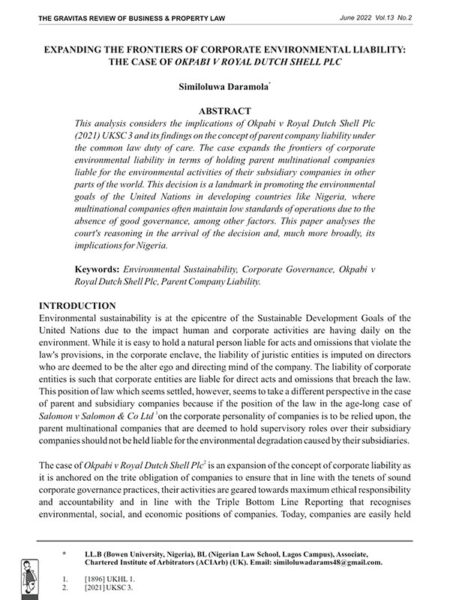
Expanding the Frontiers of Corporate Environmental Liability: The Case of Okpabi v Royal Dutch Shell Plc
0₦2,500.00Similoluwa Daramola, in her paper, Expanding the Frontiers of Corporate Environmental Liability: The Case of Okpabi v Royal Dutch Shell Plc, which reviews the English case, considers the implications of the case and the court’s decision on the concept of the parent company liability under the common law duty of care. The case expands the frontiers of corporate environmental liability in terms of holding parent multinational companies liable for the environmental activities of their subsidiary companies in other parts of the world. Similoluwa argues that the decision is vital in promoting the environmental goals of the United Nations in developing countries like Nigeria, where multinational companies often maintain lower standards of operations.
-
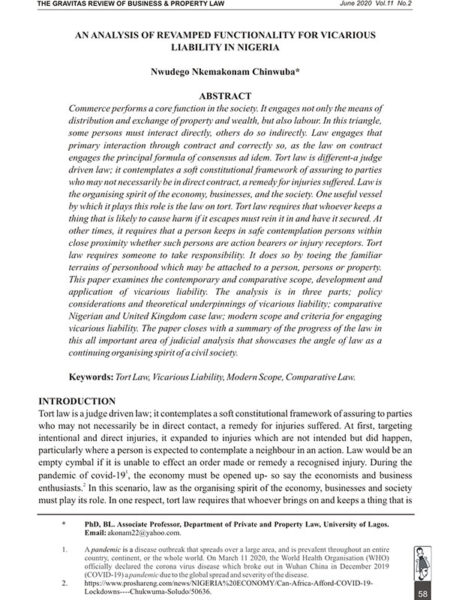
An Analysis of Revamped Functionality for Vicarious Liability in Nigeria
0₦2,500.00Dr Chinwuba Nwudego, Associate Professor of Law University of Lagos Akoka Nigeria in her article, An Analysis of Revamped Functionality for Vicarious Liability in Nigeria, observes that Tort Law, a judge driven law, contemplates a soft constitutional framework of assuring to parties who may not necessarily be in direct contract, a remedy for injuries suffered. She examines the contemporary and comparative scope, development and application of vicarious liability in Nigeria and the United Kingdom. She further explores the policy and theoretical basis, and the modern scope and criteria for engaging vicarious liability. She summarises the progress of the law in this area and shows how it has continued to be the organising spirit of society.
-
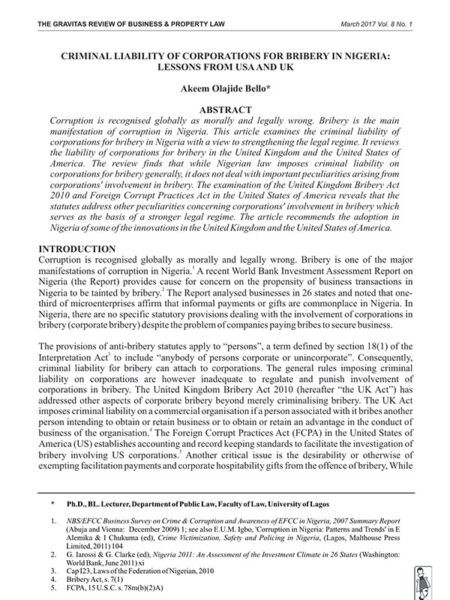
Criminal Liability of Corporations for Bribery in Nigeria: Lessons from USA and UK
0₦2,500.00Dr Akeem Bello of the Department of Public Law, University of Lagos in his article “Criminal Liability of Corporations for Bribery in Nigeria: Lessons from USA and UK” examines Nigerian law on bribery and posits that there is no specific legislation designed to criminalise corporate bribery. He examines the criminality of ‘Facilitation Payment’ and ‘Corporate Hospitality’ and recommends that expanding the scope of bribery offences to cover all “persons”irrespective of whether they are public, private sector officials or corporate entities will strengthen the law on bribery in Nigeria.
-
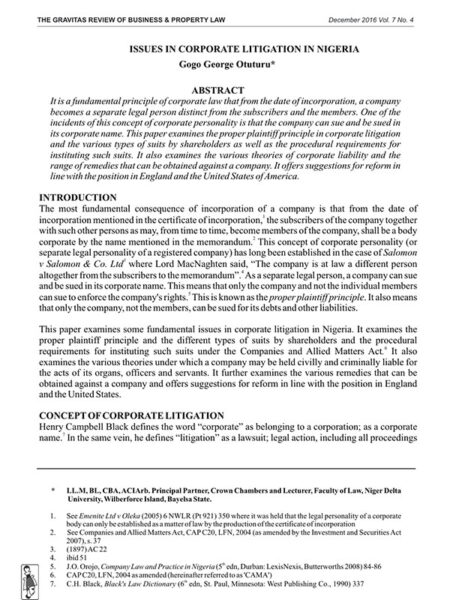
Issues in Corporate Litigation in Nigeria
0₦2,500.00Gogo Otuturu of the Faculty of Law, Niger Delta University, Wilberforce Island, Bayelsa State in his article “Issues in Corporate Litigation in Nigeria” examines a myriad of issues in corporate litigation including theories of corporate liability, the proper plaintiff principle, personal, representative and derivative actions by shareholders, pre-action notice and limitation period.
-
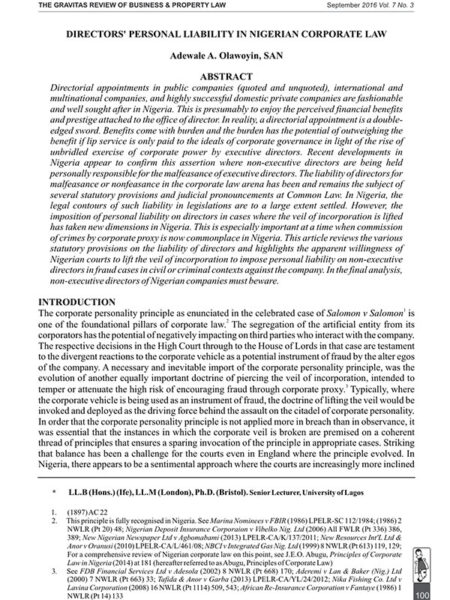
Directors’ Personal Liability in Nigerian Corporate Law
0₦2,500.00Dr. ‘Wale Olawoyin, SAN of the Faculty of Law, University of Lagos in his article “Directors’ Personal Liability in Nigerian Corporate Law” reviews various statutory provisions on liability of directors and highlights the apparent willingness of Nigerian courts to lift the veil of incorporation to impose personal liability on directors, including non-executives. He posits that while the liability of directors for malfeasance or nonfeasance in the corporate law arena has been a subject of several statutory provisions and judicial pronouncements at Common Law, the legal contours of such liability in legislations are to a large extent settled in Nigeria. The imposition of personal liability on directors in cases where the veil of incorporation is lifted has taken new dimensions especially now when commission of crimes by corporate proxy is commonplace in Nigeria.
-
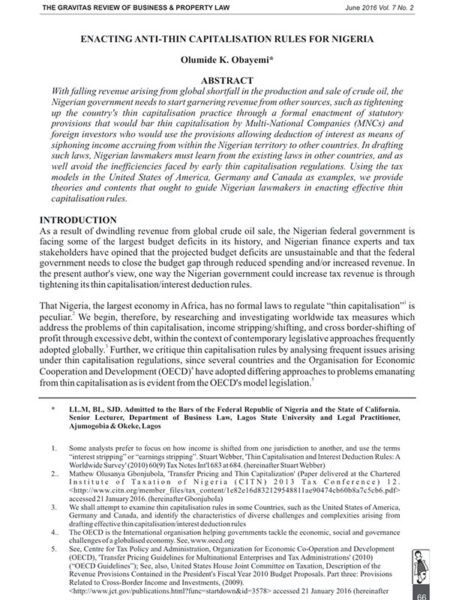
Enacting Anti-thin Capitalisation Rules for Nigeria
0₦2,500.00Dr Olumide Obayemi, Legal Practitioner, Ajumogobia & Okeke and Senior Lecturer, Department of Business Law, Lagos State University Ojo, examines an important topic that straddles corporate law, corporate finance and taxation. In his article, “Enacting Anti-Thin Capitalisation Rules for Nigeria”, he examines a financing strategy mostly favoured by multinational corporations (MNCs) in making investments outside their home nations. As debt is often a more tax efficient method of finance than equity because interest is tax deductible while dividend is not, most jurisdictions have prescribed rules to deal with the debt/equity mix by placing a ceiling on debt/equity ratio so that their tax base is not eroded as foreign firms finance their subsidiaries with excessive debt. Dr Obayemi explores anti-thin capitalisation rules in several jurisdictions and advocates the enactment of effective anti-thin capitalisation rules in Nigeria with a safe harbour of 1.5 to 1 debt-to-equity as the starting point.
-
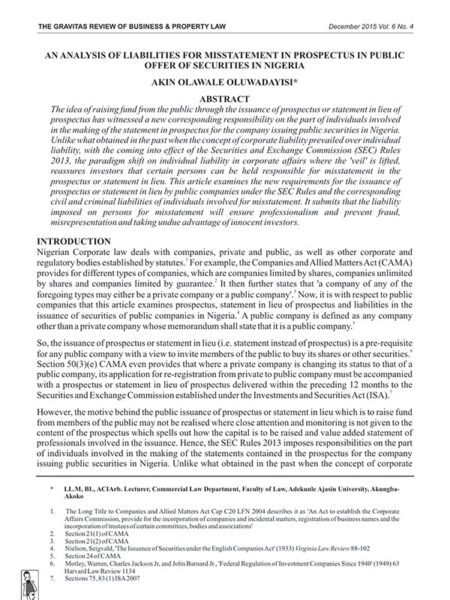
An Analysis of Liabilities for Misstatement in Prospectus in Public Offer for Securities in Nigeria
0₦2,500.00Akin Oluwadayisi, Lecturer, Commercial Law Department, Adekunle Ajasin University, Akungba-Akoko in “An Analysis of Liabilities for misstatement in Prospectus in Public Offer of Securities in Nigeria” discusses the liability of officers of a company and professionals for untrue statements in Prospectus in public offer of securities. He argues that individual liability now provided for by regulations is necessary to ensure professionalism and prevent fraud and abuse.
-
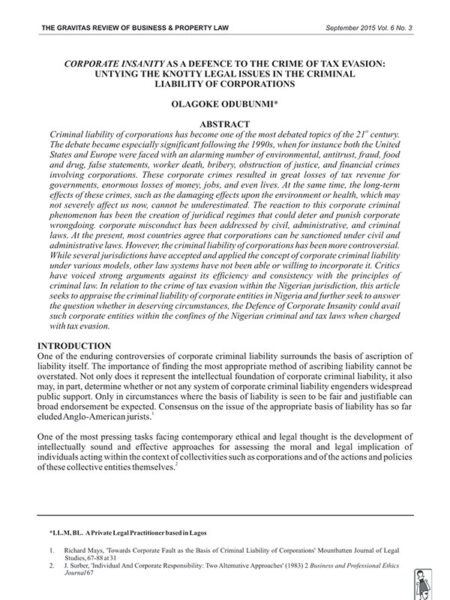
Corporate Insanity as a Defence to the Crime of Tax Evasion: Untying the Knotty Legal Issues in the Criminal Liability of Corporations
0₦2,500.00Odubunmi Olagoke in his article “Corporate Insanity as a Defence to the Crime of Tax Evasion: Untying the Knotty Legal Issues in the Criminal Liability of Corporations” explores the various theories of criminal liability and consider, from a distillation of the principles, the defence of Corporate Insanity to a crime of tax evasion.
-
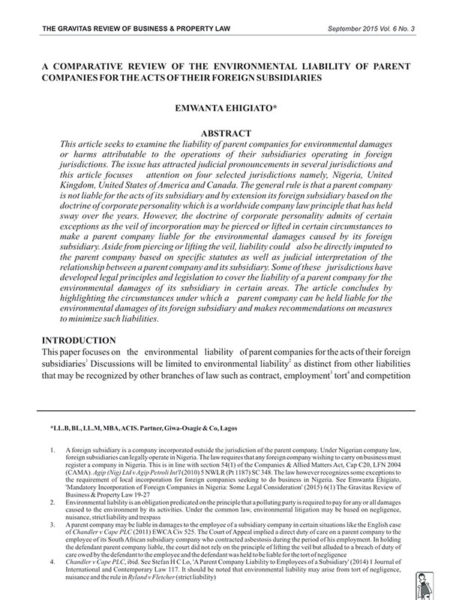
A Comparative Review of the Environmental Liability of Parent Companies for the Acts of their Foreign Subsidiaries
0₦2,500.00Emwanta Ehigiato, Partner, Giwa-Osagie & Co in “A Comparative Review of the Environmental Liability of Parent Companies for the Acts of their Foreign Subsidiaries” examines the liability of parent companies for the acts of their foreign subsidiaries especially in cases of environmental infractions. He gives a robust overview of corporate liability in several jurisdictions while analysing the state of the law in Nigeria.
The Gravitas Review of Business & Property Law



